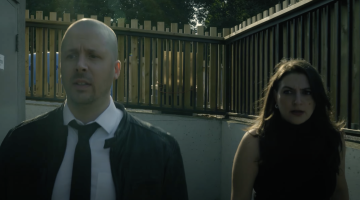This week’s #WebSeriesWednesday featured a show I was fortunate to see on the big screen at the HollyWeb Festival last month. I ran into Louis Grant himself (actor / creator Damien Blackshaw) at the awards show after party and was able to line the show up for this week.
One of the coolest things about Louis Grant is that it only took three months between the start of writing to the end of production. There are a few reasons they were able to accomplish this that are worth discussing. The main idea here is to keep things simple and use your available resources.
![second-transitions[1]](https://snobbyrobot.com/wp-content/uploads/2013/05/second-transitions1-265x300.jpg) The series was co-written by co-creators Damien Blackshaw and Todd Green. The two were on the same page with regards to the vision for the series. With each taking responsibility for three episodes each I was not able to distinguish any noticeable differences in writing styles. Writing as a team clearly speeds up the process and seemingly increases the overall quality of the writing as well. What I like is that the show’s concept is pretty simple, Louis Grant is a douche bag with a kid and an uncanny ability to come off as sympathetic. Each episode is then basically centered around one joke that proves that point.
The series was co-written by co-creators Damien Blackshaw and Todd Green. The two were on the same page with regards to the vision for the series. With each taking responsibility for three episodes each I was not able to distinguish any noticeable differences in writing styles. Writing as a team clearly speeds up the process and seemingly increases the overall quality of the writing as well. What I like is that the show’s concept is pretty simple, Louis Grant is a douche bag with a kid and an uncanny ability to come off as sympathetic. Each episode is then basically centered around one joke that proves that point.
The six episodes are about five minutes each and take place almost entirely in a single location. Each scene typically centers around one very specific room as well. Blackshaw and Green intended for the show to have the feel of a sitcom, and of course the sitcom format was originally developed to be an efficient method of production. The house was where Todd Green was living at the time, so it was easily accessible .
When you keep it simple you can achieve a higher level of production value because you spend more time doing less things. During our #WebSeriesWednesday chat Damien and Todd referred to the difficulty of shooting in a room with such a huge window. What is funny about that is, I thought those scenes looked great. By putting so much attention on that one room they were able to really get it down and produce something that looked good despite the extra challenges.
After watching Louis Grant and learning about the show’s creation, it’s easy to start thinking of ways to implement these same strategies into your own productions. What do you have at your disposal? A house? A baby? With simple productions you can go quite quickly and push out content consistently.

There were definitely some negatives worth mentioning as well. *After just taking three months to get all the way through production it took roughly a year to get through post. There weren’t any snazzy visual effects either. According to the creators this is one of the risks of the super low budget production. While Blackshaw and Green were able to cover the writing, directing and lead character roles on their own, certain other jobs were outsourced to people willing to do the work as a favor. When people are doing you favors it is difficult to maintain accountability and even more difficult to have high expectations. After the chat I came away with the impression that if you cannot do certain work yourself, you really need to pay someone to do it.
Another bit of downside comes from the super fast writing process. Louis Grant is a great character, well defined in the show, and it’s full of quality jokes. My only critique is that the pacing of the jokes is a little slow. These days we are spoiled by sitcoms with huge writing teams behind them knocking out a joke every few seconds. It’s not that the jokes are better or the writers are better, it’s simply that when you put more man hours into writing you get more jokes.
Overall Louis Grant is a great study in efficient production as well as a look into the life of a rather interesting character. You can find Louis at his web site http://louisgrantseries.com












No Comment